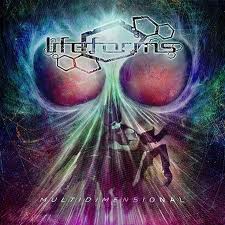
Album Review: Lifeforms - Multidimensional
Recent times have been quiet for the burgeoning djent scene. After a rush of releases thrust the fledgling music upon the masses, the stream of releases capturing the zeitgeist of the times has slowed to a trickle. I can't say whether it's a coincidence, or if the recent albums from genre leaders Periphery and grandfathers of all that is djent Meshuggah, may have made many of their followers go back to the drawing board. Whatever the case, Lifeforms is releasing “Multidimensional” at just the right time, when there is little competition, and when people have had enough time to hunger for more of this kind of music.
Not long into the album intro, “Descent Into Madness”, there's no denying the kind of music that Lifeforms is intent on making. Heavy on the lurching, mathematical polyrhythms that made Meshuggah modern-day legends, Lifeforms takes that sound as their Bible, reinterpreting the elements to make their own blend of metallic mayhem. The title track is filled with enough odd cadences and riffs that sound like editing mistakes that it takes several minutes to figure out exactly what's going on. It's a sophisticated approach to song construction that's intended to be listened to in the most visceral of manners. That's an interesting dichotomy, and possibly the most interesting aspect of the album.
I admit I am not the target audience for this kind of music. The repetitive, mechanical, unyielding assault of massively down-tuned guitars is the sort of thing that works in short bursts, but begins to grate on me after more than five minutes. Like Meshuggah, Lifeforms tries to be a progressive band, but doing so while utilizing only rhythm makes the effort a non-starter. Embracing only half of what makes music music is not enough to build an album from, which “Multidimensional” proves throughout its running time.
A song like “Illogical” has all the right elements, and the clear guitar break that sits between the crushing end sections is a nice diversion from a complete assault on the senses. Taken as a one-off, it would be a fairly good djent song I wouldn't mind hearing. But when track after track follows in similar spirit, with little variation in the sound or mood, and with vocals that do little but screech atop the droning, it's difficult to remain interested in hearing what comes next. There are elements that are exciting, notably the effective chorus section of “String Theory”, which manages to harness the rhythm enough to introduce a bit that wouldn't be out of place on a catchy death metal record, but those are few and far between. Too much of the album is focused on drilling rhythms into your head, and much like when math class tried the same thing with theorems, it makes me want to zone out.
Much of that problem isn't Lifeforms' fault, it a restriction of the genre they have chosen. Meshuggah set the standard for music that isn't really music, and while they might have been able to stand out by being the only one plying that particular craft, Lifeforms just doesn't have the same spark to keep the gimmick alive. “Multidimensional” is as good a Meshuggah clone as I can recall coming across, but even the masters are music I would never go out of my way to listen to, and Lifeforms lacks the memorable riffs their inspiration is able to play in those crazy time signatures. As a musician, I'm intrigued by the experiments with rhythm the music engages in, but I don't hear much in the way of actual songs.
If you're someone who is concerned with heaviness first and foremost, this is for you. But if you're like me, and you think music can't exist without melody, you're going to be sorely disappointed.

